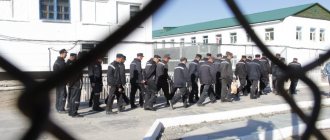Home / News and changes
Back
Published: 10/29/2019
Reading time: 3 min
0
301
In October 2022, Federal Law No. 331 of October 1, 2019 came into force, which amended Federal Law No. 64 of April 6, 2011, which regulates the process of administrative supervision of citizens released from prison.
- What is administrative supervision
- Imposed prohibitions and obligations
- How and by whom administrative supervision is established for those sentenced to forced labor
- Possibility of extending supervision
- Obligation of supervised persons to report a change of place of residence
General provisions of the Federal Law
Article 1 of the presented normative act contains information about the basic concepts and terms that may be used in subsequent provisions of the law. The first and most basic concept that is worth highlighting here is called administrative supervision. What it is?
The law defines administrative supervision as monitoring a person recently released from prison. Supervision is carried out by internal affairs bodies. A supervised person is a citizen in respect of whom supervision is carried out. The supervised person is often subject to certain administrative restrictions. These, according to the law, are restrictions on individual freedoms and rights of a person returning from prison.
What is the main objective of Federal Law 64 “On Administrative Supervision”? Article 2 talks about preventing the commission of crimes and offenses.
Possibility of extending supervision
Supervision may be extended in the following cases (Article 7 of Federal Law No. 64 of 04/06/2011):
- the supervised citizen, during his supervision, committed crimes that do not require imprisonment as punishment : administrative offenses, suspended or deferred sentences, etc.;
- a citizen has committed two or more administrative offenses against law and order within a year, or has been caught driving a vehicle while intoxicated twice or more or has refused a medical examination.
For whom is administrative supervision established?
Article 3 of Federal Law No. 64 “On Administrative Supervision” states that the court may establish a requirement in accordance with which supervision by internal affairs bodies will be carried out in relation to the following persons:
- repeat offenders;
- who have committed a crime of a grave or especially grave nature;
- who have committed intentional crimes against persons under the age of majority.
A person who has an outstanding criminal record or has constantly violated order in places of imprisonment must be placed under special administrative supervision.
What is administrative supervision
Administrative supervision is monitoring by internal affairs bodies of a citizen released from prison. Monitoring primarily concerns compliance with restrictions on the rights and freedoms of such a citizen, as well as the fulfillment of the duties assigned to him by a court decision.
Supervision is established for supervised persons with an outstanding criminal record if (Article 3 of Federal Law No. 64 of 04/06/2011):
- the citizen is a persistent violator of prison regulations;
- the citizen has committed two or more crimes against law and order or two or more crimes dangerous to the life and health of other citizens.
In addition, administrative supervision is established if the person under supervision:
- Committed a serious or especially serious crime.
- Is a repeat offender.
- Committed an intentional crime against a minor.
- Committed two or more drug trafficking crimes.
Administrative supervision in any case is established without observing the above conditions for the following categories of citizens:
- Those who have committed sexual crimes against minors.
- Those who are particularly dangerous repeat offenders for society.
- Those who committed murder for reasons of intolerance towards a certain group of people , hostage-taking, terrorism, etc.
About restrictions and deadlines
As already mentioned, a supervised citizen is somewhat limited in his rights. According to Federal Law 64 “On Administrative Supervision”, these may be restrictions of the following nature:
- ban on staying in certain places, the list of which is established by the court;
- ban on attending public events;
- ban on leaving the territory specified by the court;
- restriction of stay in certain places during certain periods of the day.
It is also worth noting that the court is obliged to establish the following restrictions on supervised persons:
- the citizen must appear several times a month (the exact number is established by the court) to the internal affairs body for registration;
- ban on leaving the territories established by the court.
Courts or other authorized bodies must collect information about the supervised citizen. Based on the information collected, a decision will be made on the possible lifting of the established restrictions. In relation to a person who has served a sentence for a crime against a minor’s sexual freedom and sexual integrity, administrative supervision cannot be terminated early.
It is also worth talking about the period during which administrative supervision can be implemented. Here everything strictly depends on the type of crime committed by the person returning from prison. However, in accordance with Article 5 of Federal Law No. 64 “On Administrative Supervision,” restrictions cannot operate for less than one year and no more than three years to expunge a criminal record. There is another option here, in which the duration of serving the sentence is subtracted from the period for expunging a criminal record.
Federal Law of April 6, 2011 No. 64-FZ
1. Administrative supervision is established in relation to:
1) persons specified in Part 1 (clauses 1 and 2) of Article 3 of this Federal Law, for a period of one to three years, but not more than the period established by the legislation of the Russian Federation for expunging a criminal record;
2) the persons specified in Part 1 (Clause 3) and Part 2 of Article 3 of this Federal Law, for the period established by the legislation of the Russian Federation for expunging a criminal record, minus the period that has expired after serving the sentence;
3) the persons specified in Part 2.1 of Article 3 of this Federal Law, for the period of imposing compulsory measures of a medical nature, but not less than the period established by the legislation of the Russian Federation for expunging a criminal record.
(The paragraph was additionally included from January 10, 2014 by Federal Law of December 28, 2013 No. 432-FZ.)
2. In the cases provided for in Article 7 of this Federal Law, administrative supervision may be extended for a period of up to six months, but not beyond the period established by the legislation of the Russian Federation for expunging a criminal record.
3. The period of administrative supervision is calculated in relation to:
1) the person specified in Part 1 of Article 3 of this Federal Law, if there is a basis provided for in paragraph 1 of Part 3 of Article 3 of this Federal Law, and the persons specified in Parts 2 and 2.1 of Article 3 of this Federal Law, from the date of registration with the internal affairs body at the chosen place of residence or stay;
(Clause as amended, put into effect on January 10, 2014 by Federal Law of December 28, 2013 No. 432-FZ - see previous edition.)
2) the person specified in Part 1 of Article 3 of this Federal Law, if there is a basis provided for in paragraph 2 of Part 3 of Article 3 of this Federal Law, from the day the court decision to establish administrative supervision comes into force.
4. If a person is assigned a restriction of freedom as an additional type of punishment, as well as when replacing the unserved part of a sentence in the form of imprisonment with a restriction of freedom, the period of administrative supervision is calculated from the day the sentence in the form of restriction of freedom is served.
5. The period of administrative supervision is suspended in the event of:
1) putting a supervised person on the wanted list;
2) recognition of the supervised person as missing;
3) taking the supervised person into custody.
6. After the elimination of the circumstances that served as the basis for suspending the period of administrative supervision, the course of such period continues.
On the establishment, termination, extension and implementation of administrative type supervision
In accordance with Federal Law No. 64-FZ “On Administrative Supervision”, supervision of persons released from prison is established by the court upon the application of the correctional institution. Extension of the period of supervision may also be carried out by the court. The main reasons for extending the supervision period are, as you might guess, the commission of an offense by the supervised citizen.
The decision to terminate administrative supervision is made by the court in the following cases:
- expiration of the supervisory period;
- removal of a criminal record from a person in respect of whom supervision was carried out;
- conviction of a supervised person and sending him back to prison;
- in connection with the death of a supervised person;
- due to the application of mandatory medical measures against a supervised person.
The comments to Federal Law 64 “On Administrative Supervision,” as amended in 2022, state that supervision can be terminated early if the supervised person conscientiously fulfills the duties assigned to him. What responsibilities does a citizen who is being supervised have? This will be discussed further below.
Imposed prohibitions and obligations
The following prohibitions may be imposed on a citizen under administrative supervision (Article 4 of Federal Law No. 64 of 04/06/2011):
- to visit certain places;
- to attend cultural events;
- leaving the house at night;
- to travel outside the city, region or country.
In addition, the supervised person is required to report to the Ministry of Internal Affairs up to four times a month. Supervision is established through the court at the request of the administration of the correctional institution.
During the period of supervision, the court has the right to remove or add restrictions and obligations for the citizen.
On the rights and obligations of a supervised citizen
The person in respect of whom supervision is carried out is obliged to comply with all orders established by the court, namely, register with the police department, notify the authorities of a change of place of residence, allow police officers to enter his home, etc.
Federal Law-64 “On Administrative Supervision”, as amended on May 28, 2017, also establishes the basic rights of the supervised citizen. It is worth highlighting here:
- applying to the court for early termination of supervision;
- appealing court decisions;
- applying to the Department of Internal Affairs for short-term travel permission.
What amendments were made to Federal Law 64 in May 2022? Here it is worth highlighting the addition of Article 1 with the concept of “actual place of residence”. That is, a person released from prison and without a place of residence chooses his actual location (the territory of an intra-city district or intra-city municipality).
How and by whom administrative supervision is established for those sentenced to forced labor
In accordance with the changes prescribed in Federal Law No. 331 of October 1, 2019, the period of administrative supervision is now suspended for those citizens who have had part of their unserved prison sentence replaced with forced labor for the duration of this work (the fourth part of Article 5 of Federal Law No. 64 of April 6, 2011) .
Supervision over citizens sentenced to correctional labor, in accordance with Article 60.18 of the Penal Code of the Russian Federation, is carried out by the administration of the correctional center, which monitors and controls the convicts. If the actions of the supervised person may turn out to be illegal, and also threaten the life and health of others or himself, the citizen may be placed in premises for short-term detention of prisoners for up to a day.





